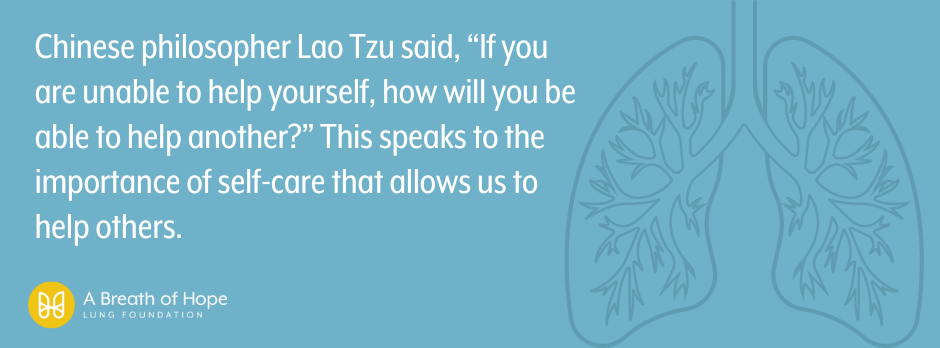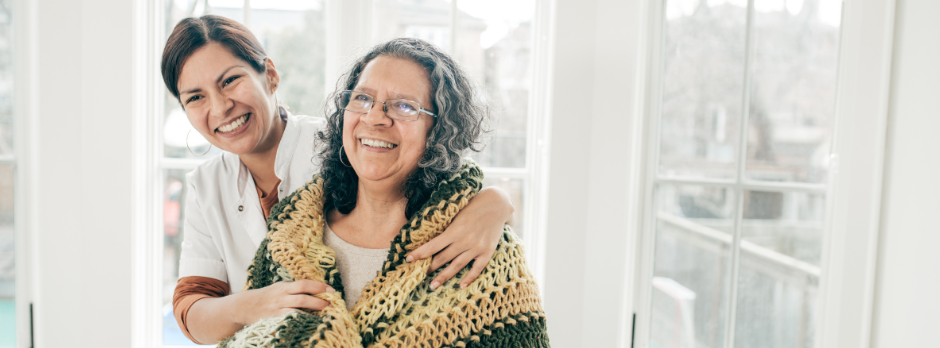Rose Ivey, RN and Nancy Torrison, Executive Director of ABOH
The definition of a family caregiver is someone who provides care for a loved one facing health challenges, often without formal training or compensation.
Becoming a caregiver for a family member does not happen overnight and is rarely part of our future plans. We make plans for our retirement, old age, and end-of-life care, but have not given serious consideration to what it would mean to become a caregiver for a family member or close friend who is critically ill.
It’s when our spouse, children, family members or close friends become ill and need our support and care that we move into the caregiver role. It may start slowly with no thought beyond a doctor’s appointment for what seems to be a short-term illness. But what began with a few hours off work can quickly become a drain on sick days or vacation time. This is also true for the ill family member.
The day-to-day routine for your family has begun to change, but you still think of this time as a short-term change. Once the doctors find answers and treatment begins for your loved one, you hope that everything will soon be back to normal.
But a cancer diagnosis was the last thing you thought you would hear, and it takes you hours, days, or weeks to process and absorb, and there is no return to normal. Life as you know it has changed.
You go through your days with a new purpose and strength to show the world (and yourself) that you are not giving up. Our family will defeat this disease. Family and friends start to reach out to us for updates. For a while, neighbors may drop off food and meals for the family. But over the many months of treatment and care, contact with the outside world often decreases. It is a busy time, and you may feel overwhelmed by the new responsibilities and information that has become your reality. You may begin to feel alone in your struggles, wondering if anyone understands all that is on your plate.
It can be difficult to accept that you need care, too. You can tell yourself that once your loved one no longer needs your help, you will take the time for self-care, but this delay in meeting real needs can also lead to poor health and deepening stress.

Guilt
Even when you have nothing to feel guilty about, guilt is a common sentiment among caregivers. Working through and analyzing these feelings is an important first step. What you find may not be rational or even realistic, but it becomes a genuine barrier to your self-care and is easier to address once it is identified.
It is important to resist feelings of guilt that shame you into going it alone. Finding someone with whom you can share openly and honestly, a family member or friend can make the journey easier. Whether this person simply listens or offers suggestions and ideas, having someone to share the burden can reduce the feelings of helplessness and isolation.
Diet
A healthy, balanced diet and good hydration are extremely important for caregivers. A diet of fast or processed foods is not the best answer during life’s most serious struggles. It may be quick and easy, but it can also leave you feeling sluggish and out of sorts. Eating a diet that includes fresh, healthy fruits and vegetables along with complex grains will help you find the strength, energy, and clear head you need to feel your best when your home situation has become difficult.
Exercise
For some caregivers, their work becomes physical. Turning, lifting, and changing your loved one is physical work that can require more strength than you feel you possess. For this group, physical exercise becomes a necessity simply to accomplish the work that must be done each day. For others, exercise is vital to mental wellbeing. It can energize your muscles and equalize your frame of mind. Finding the time and discipline to take a brisk walk outside or inside on a treadmill can alter your mood and make the challenges feel manageable. Adding music to exercise can lift your mood even more. Another form of physical activity, such as Yoga, can help you relax, build your strength, and can be accomplished in almost any environment.
Friends and Family
Having a friend to lean on can be life-changing! Try to make plans with other family members or friends to allow yourself some time off with someone you trust. Whether you choose a night out or a weekend away, the change of pace and opportunity to socialize with others will decrease your feelings of isolation and bring new energy. Joining a support group may also bring comfort by introducing you to others who share your experience and help you remember that you are not alone in your struggle.
Sleep
Sleep is important to keep us feeling renewed and focused. Getting seven to eight hours of uninterrupted sleep may not be possible at this time, but finding ways to relax our minds and bodies is critical to being able to function in the role of caregiver. Meditation, mindfulness activities, and white noise machines may be the answer to sleep deprivation, and taking advantage of your loved one’s naps by resting might be your only time to let your body refuel itself. Studies show that alcohol is not helpful for quality rest and sleep and should not be seen as an alternative to more natural sleep aids should you need help finding sleep.
Work
If you are the caregiver for your spouse, your work may be the only income for the family at this time. If you are the caregiver for a child, you may not want to leave their side. Some employers offer no options, but it is recommended that caregivers speak to their supervisor if possible and keep the communication open. Are there work-from-home projects that can be completed outside of the office? Do you have an HR department to explore your options, such as a leave of absence, short-term disability, or family medical leave?
Conversations with your loved one
For some caregivers, this time is happening at the end of their loved one’s life. Choosing to avoid meaningful conversations can leave you with regrets later. Not having regrets (such as unfulfilling communication) is a good goal to strive for at this time. Have you discussed end-of-life care with your loved one? Have you created a Living Will with Health Directives? A legal will? Have you named a Power of Attorney? In most cases, our loved ones will feel comforted by open communication and the knowledge that their final wishes are being honored. The clarity will mean a lot to both of you. It can be helpful and calming to first practice what you want to say before talking to your loved one about end-of-life care.
Ask for help
When someone is seriously ill, their entire community feels helpless. It can be a gift to ask others to help you when your plate is full. It is difficult for most of us to ask for help, but it is important to remember that you and your entire family will benefit from having you stay healthy and at your best. Asking for help doesn’t mean that you are weak or failing in your caregiver role, it simply means that you are realistic – you can’t do it all.
Look at the tasks you must complete and decide which activities can be delegated to others. Are there family members who wish to be helpful? Maybe a neighbor can pick up the kids after school? Maybe other parents would be willing to invite your children to dinner or a sleepover to give you a break? Is there a grocery delivery service that would save you time and remove a task from your list? Does your local pharmacy deliver or have drive-up services?
Caregivers need care, too. Our hope at A Breath of Hope Lung Foundation is that you will take your self-care duties seriously, and if you need help, don’t hesitate to call our office.
Educational References
www.cancer.gov/publications/patient-education/when-someone-you-love-is-being-treated
www.caregivers.com
www.cancer.gov
www.caringbridge.com


